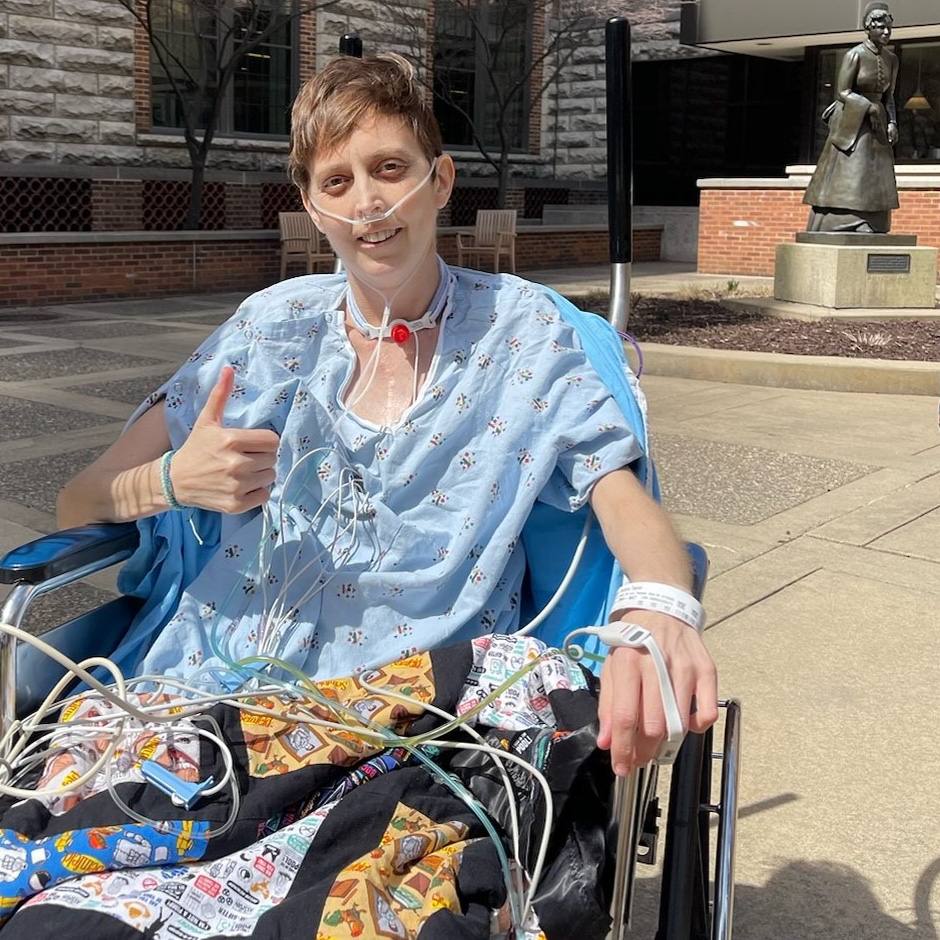-
Sharing Mayo Clinic
Careful Evaluation, Genetic Testing Offer a New Path Forward

Diagnosed with multiple sclerosis, Maureen Jessen, always wondered why the disease affected her so differently than it did others. Doctor after doctor told her that MS was likely causing her symptoms, so she believed them. Mayo Clinic specialists, however, gave Maureen new insight into her illness — one that had nothing to do with MS.
For 20 years, Maureen Jessen was a poster child for multiple sclerosis (MS). She worked and volunteered at the Hartford, Connecticut, chapter of the National Multiple Sclerosis Society, raised money for research on the neurodegenerative disease, and participated in research studies aimed at learning more about the illness.
Maureen's diagnosis had never been clear-cut, but she followed her neurologist's advice and took prescription medications to treat her MS. When Maureen and her husband relocated from New England to Phoenix in October 2019, she arranged to obtain care at Mayo Clinic in the Center for Multiple Sclerosis and Autoimmune Neurology.
Maureen was aware of the high-caliber care offered at Mayo Clinic, but she never imagined just how comprehensive and patient-centric her experience would be. Maureen's Mayo Clinic MS specialists, Cristina Valencia Sanchez, M.D. Ph.D., and Dean Wingerchuk, M.D., offered personalized care that uncovered the reason why her manifestations of MS didn't align with typical MS symptoms. Maureen didn't have MS.
Maureen actually has a rare, genetic metabolic disorder called cerebrotendinous xanthomatosis, or CTX, which affects the metabolism of cholesterol and bile, and results in systemic neurologic abnormalities.
"My husband and I have joked for years that I was always looking for my Dr. House," says Maureen, referring to the lead character in a popular doctor-detective TV series. "Someday I was going to find my Dr. House, and it's the weirdest thing in the world that here I came to Mayo Clinic in Arizona, and I found him."
Maureen's condition, which is thought to affect only a few hundred people in the world, is not something Mayo Clinic physicians often see. But in Maureen's case, uncovering the correct diagnosis was significant for her care.
"It's a pretty meaningful outcome for her to know what she has," Dr. Wingerchuk says. "I think that's important for her and her family, so she can not only be on treatment for this condition, but also stop potentially harmful treatments for MS. It has a big impact."
Finding the needle in the haystack
Maureen experienced the first symptom of her disease, a slight limp, in 1999. Her neurologist ordered an MRI and saw what he believed was a suspicious spot on her spine. "That started me down that road for MS," Maureen says. "But when they redid MRIs and spinal taps and all of the other tests, they came back negative."
As her symptoms progressed, Maureen's limp became more pronounced, and she developed sensory issues, such as numbness and tingling. "Because there was nothing else to really diagnose me with, they went ahead and diagnosed me with MS," she says.
Several second opinions yielded the same diagnosis. "We decided that it was just kind of a weird MS," Maureen says. "I've run into other people in similar situations, so I thought: "OK. I'm one of a few."
While Maureen's symptoms didn't clearly point to MS, neither did they align with typical presentations of CTX, says Maureen's neurologist and geneticist Radhika Dhamija, M.B.B.S., in Mayo Clinic's Department of Clinical Genomics.
"Her clinical picture is very unusual. It's not like someone missed it. She just had nothing to suggest it initially and carried the incorrect diagnosis of MS for decades."
Radhika Dhamija, M.B.B.S.
In people with CTX, fatty deposits called xanthomas form throughout the body, most commonly growing in the brain and tendons that attach bone to muscle. The xanthomas develop as a result of the body not being able to break down different forms of cholesterol called lipids.
"Her presentation is atypical, even for CTX. Most physicians would not have thought of it," Dr. Dhamija says. "She doesn't have typical manifestations like cataracts, and her cognition is intact. Her MRIs are abnormal now, but they weren't that abnormal before. Her clinical picture is very unusual. It's not like someone missed it. She just had nothing to suggest it initially and carried the incorrect diagnosis of MS for decades."
Before Maureen's Mayo team identified CTX as a possible culprit for her symptoms, they ruled out a number of other illnesses. "We started by looking at common causes of myelopathies, or spinal cord problems," Dr. Valencia Sanchez says. "We looked for vitamin B12 deficiency, copper deficiency, autoimmune-mediated conditions and infections that may cause myelopathy, which were all negative."
After eliminating the most common causes of spinal cord disorders, the team started thinking about rarer conditions. One symptom Maureen mentioned during her initial consults — swollen and sore Achilles tendons — gave the team pause.
"The report about the Achilles tendon tears caught our interest because the patient was actually pretty impaired as far as her mobility by the time she was diagnosed with the tears, which is really quite unusual," Dr. Wingerchuk says. "We don't see Achilles tears in people with MS who have mobility problems. That's just not common, so that was another possible clue."
Research into conditions associated with enlarged Achilles pointed the team to CTX. "That is when we decided to refer the patient to Dr. Dhamija in our Neurogenetics Clinic," Dr. Valencia Sanchez says.
Accurate answers lead to targeted therapy
When tests confirmed that Maureen had CTX, she established care with Dr. Dhamija and started taking two medications. One is a prescription cholesterol-lowering medication. The other is a specially formulated drug that prevents the fatty deposits that lead to seizures, loss of sensation in the arms and legs, heart disease and intellectual decline.
Given the rarity of CTX, little information is available about its prognosis and outcome, even when patients are receiving treatment. "It's very hard to know what to expect," Maureen says. "There are definitely cases that show this drug will basically prevent the cholesterol from … creating havoc on your body. So my hope is this drug will prevent all the other things that can cause issues. The hope is it will prevent future disability."
"They can't say, 'You're cured,' because I was diagnosed so late, but we're more hopeful than before. I feel more confident with this."
Maureen Jessen
Although CTX has no cure, the fact that Maureen has a validated diagnosis with a targeted treatment makes her optimistic that the effects of the illness can be halted. "They can't say, 'You're cured,' because I was diagnosed so late, but we're more hopeful than before," says Maureen, who now uses a wheelchair to get around. "I feel more confident with this."
The experience of discovering her rare disease and beginning new treatment has been a whirlwind, but the speed at which Maureen's team discovered and addressed her illness reinforced her belief about Mayo Clinic.
"I was impressed," Maureen says. "Once they knew I had this disease, they got me in —especially because of my heart. They were very concerned about how my heart looked. So on the same day I got the diagnosis, I got tests of my heart, which were negative. My heart is good. When push comes to shove, they make things happen."
For patients like Maureen, whose symptoms don't clearly align with a diagnosis, having a medical team that remains dedicated to finding answers — no matter how obscure the problem — is crucial.
"What concerned us was that the diagnosis of MS appeared to be given by default several times by different doctors despite her not having any typical MS features," Dr. Wingerchuk says. "That's why we questioned the diagnosis in the first place, and I think that's something we do for every patient we see here."
HELPFUL LINKS
- Read about Mayo Clinic's approach to treating rare diseases.
- Learn more about the Department of Clinical Genomics.
- Check out the Center for Individualized Medicine.
- Explore Mayo Clinic.
- Request an appointment.
Related Articles







